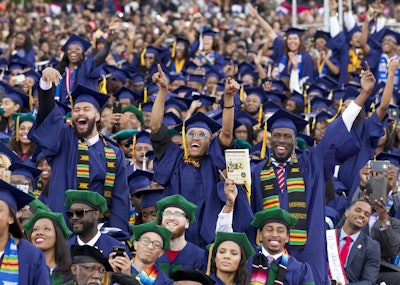A new report from the American Academy of Arts and Sciences offers promising insights into the state of humanities programs at Historically Black Colleges and Universities (HBCUs), even as humanities degree completions decline across the nation. The report titled “Tracking the Health of the Humanities at HBCUs” highlights how HBCUs continue to play a critical role in maintaining humanities education and diversifying the student body in these fields.
While the number of students earning humanities degrees has steadily dropped nationwide, the report presents a more hopeful picture for HBCUs. Humanities degree completions at HBCUs have also declined, but the drop has been more gradual, and numbers have largely stabilized in recent years. Between 2014 and 2022, humanities degree completions at HBCUs decreased by 15%, compared to sharper declines at non-HBCU institutions.
In 2022, HBCUs awarded 8.8% of their bachelor’s degrees in the humanities, a share that matches the percentage at non-HBCU institutions. Historically, HBCUs focused more on vocational subjects and awarded a smaller portion of degrees in the humanities. However, this new data shows that HBCUs are maintaining their commitment to the humanities even as the field faces broader national declines.
Dr. Marybeth Gasman, who holds the Samuel DeWitt Proctor Endowed Chair in Education is a distinguished professor and associate dean for research in the Graduate School of Education at Rutgers University, emphasized the importance of humanities programs for Black students.
“For HBCUs, the sustained engagement in the humanities points to the lasting importance of these disciplines in fostering critical thinking, cultural awareness, and intellectual growth among Black communities,” Gasman said. “I can’t begin to stress how important the humanities are to liberation and freedom.”
One of the most notable contributions of HBCUs to humanities education is their role in increasing diversity among students. In 2022, HBCUs awarded 13.5% of humanities degrees earned by Black students and 3.8% of humanities degrees awarded to students from all minority racial and ethnic groups.
According to the report, 37.5% of all humanities bachelor’s degrees in the U.S. were awarded to students from minoritized racial and ethnic groups in 2022, more than double the 18% reported in 1997. This reflects progress in diversifying humanities education across the country, with HBCUs playing a central role.
Gasman credited the success of HBCUs in part to their ability to link humanities education to larger societal issues.
“My belief is that this success is due largely to faculty members’ ability to provide rich context in humanities courses and majors and link them to larger societal issues,” she said. “African American students are very interested in humanities-based questions, and HBCUs are great places to explore these issues.”
The report also highlights growth in humanities degrees among Hispanic and African American students. In 2022, Hispanic or Latino students earned 17.6% of bachelor’s degrees in the humanities, 12.5% of master’s degrees, and 8.6% of doctoral degrees in the field. The growth represents the largest contribution to the overall rise in minority students earning humanities degrees. Dr. Marybeth Gasman
Dr. Marybeth Gasman
Similarly, African American students accounted for 9.7% of humanities bachelor’s degree recipients, 8.1% of master’s degree recipients, and 5% of doctoral degree recipients, reflecting HBCUs’ essential role in expanding access to higher education for African American students.
The report also noted the continuing leadership of women in the humanities. In 2022, women earned 62.4% of all humanities bachelor’s degrees, 63.1% of master’s degrees, and 55.9% of doctoral degrees. These figures are among the highest ever recorded, highlighting the role women play across all levels of humanities education.
Despite positive trends, the report points to ongoing challenges. While more minority students are earning humanities degrees, the overall share of these degrees among minority graduates has declined. In 1997, humanities degrees accounted for nearly 13% of bachelor’s degrees earned by minority students, but by 2022, that share had dropped to 8.6%. The percentage of humanities doctorate degrees awarded to minority students also fell from 8.6% in 1997 to 5% in 2022.
“This finding raises important questions about why minority students are increasingly opting for other fields,” said Gasman. “We should be asking, ‘Are these students perceiving the humanities as offering fewer career opportunities than STEM or business, or are they encountering other institutional or societal pressures that are steering them away from the humanities?’” Gasman said.
While HBCUs are seeing some growth in specific areas, the report emphasizes that the broader decline in humanities degree completions remains concerning. But the rise of interdisciplinary programs such as liberal studies and communication, which are gaining popularity at HBCUs, offers hope that these institutions will continue to provide valuable pathways for students pursuing humanities education.















